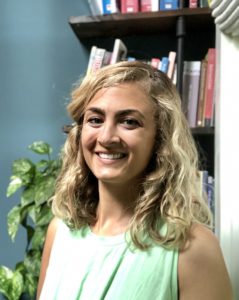This blog was written by NCTE member Danah Hashem.
Podcasting in the classroom is not necessarily a new idea, but it’s an idea that has been gaining momentum and attention in recent years.
As NCTE’s Definition of 21st Century Literacies points out, our students need experience writing with technological tools, real and diverse audiences, and multiple forms of media. Podcasting inherently and effortlessly meets all of these requirements while also acting as a relevant and engaging genre in our students’ daily lives.
Recognizing the growing interest in and power behind student-authored podcasts, National Public Radio (NPR) launched their first ever, nationwide Student Podcast Challenge last year. NPR invited middle and high school students from around the country, with guidance from their teachers, to submit podcasts of three to twelve minutes, written and produced entirely by students. The contest offered clear submission guidelines and a simple rubric, as well as thorough and clear resources for teachers and students to explore.
Feeling adventurous, I, alongside twelve intrepid student volunteers, undertook the challenge with excitement and enthusiasm. Spoiler alert: we didn’t win the competition. We did, however, have an amazing time together learning about composition, collaboration, the rhetoric of audio composition, and the genre of podcasting. As an educator, I felt strongly, and my students agreed, that this experience presented us with a fun and adventurous way to dive deep into the intricacies of creating meaning and intended impact through our writing.
Following our experiences, I have compiled a list of reasons, based on my students’ and my time preparing our submissions for the competition, why teachers of writing should seriously consider giving podcasting a try in their classrooms.
- Students were able to access and understand more traditional writing genres in deep and meaningful ways through their experiences with podcasting. One student who had been struggling with the purpose and mechanics of the argumentative literary essay had a breakthrough when writing her podcast; understanding that a clear, informative podcast required a helpful and concise introduction, presentation of evidence, analysis of that evidence, and then a synthesizing conclusion supported her sense of how an effective essay should be constructed.
- Working with new genres in unfamiliar media unlocks students’ creativity and ability to play with their writing. Students often come to us haunted by bad habits or formulaic patterns in their writing; these can be extremely difficult to address. Writing these podcasts encouraged students who sometimes struggle with asserting their unique voice to take ownership of the writing process and express themselves. A particular student who regularly demonstrates a lack of confidence in her writing happened to feel passionately about her podcast topic and took on a leadership role within her group, asserting her ideas and experience boldly and authentically. When reviewing her group’s final product, I was able to identify that her unique voice as an author came across clearly, and we could discuss how she might transfer some of the strategies from this experience back to her more traditional, academic writing.
- Podcasting has the potential to make writing real for students. As teachers of writing, we work hard to help our students understand the importance of being creative, flexible communicators, but this can be difficult when we’re teaching academic genres like research papers or argumentative essays; those aren’t genres students often see in their daily lives. Podcasts, however, are familiar and tangible. Students may listen to them themselves, and if they don’t, I’d be willing to bet that an adult, celebrity, or news station they respect and like does. One student signed up to podcast with us because he follows Shaquille O’Neal’s “The Big Podcast” and wanted to create something similar. It’s not hard to help students see that good podcasts matter, and so it’s not hard to motivate them to work at and reflect on the skills they need to be good podcast writers, skills that transfer back to the classroom in powerful ways.
While I could go on, ultimately the most tangible way to see how effective podcasting can be as a tool for teaching writing is firsthand. The resources provided by NPR make this a very accessible classroom assignment; their materials walk you through everything from drafting ideas to options for recording and editing tools. I even relied upon their competition rubric for my own grading.
My deep hope is that NPR runs this competition against next year so that even more middle and high school students can have the opportunity to hone their podcasting skills and compete on a national level; however, even if the competition discontinues, as a teacher of writing, I plan to lean on some of the experiences and lessons I shared with my students during this year’s competition, leveraging podcasting to equip and empower my students to explore their creativity and voices as writers.
Related Links
What We Heard from NPR’s First Student Podcast Challenge
Eight Student Podcasts That Made Us Smile
Coming To America: Our Best Student Podcasts About Immigration

Danah Hashem teaches 10th grade world literature and AP Language at Lexington Christian Academy in Lexington, MA, where she pursues her passions for and scholarship in digital literacies, audio rhetoric, and student-centered learning.
Follow her on Twitter at @DanahRHashem or via her blog, www.pencilsandpatience.wordpress.com.

